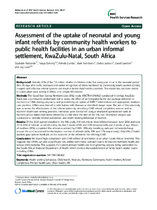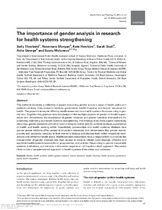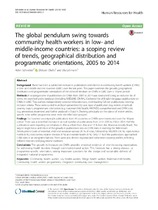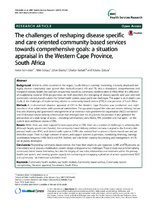Assessment of the uptake of neonatal and young infant referrals by community health workers to public health facilities in an urban informal settlement, KwaZulu-Natal, South Africa
Assessment of the uptake of neonatal and young infant referrals by community health workers to public health facilities in an urban informal settlement, KwaZulu-Natal, South Africa
Date
2013Author
Nsibande, Duduzile
Doherty, Tanya
Ijumba, Petrida
Tomlinson, Mark
Jackson, Debra
Sanders, David
Lawn, Joy
Metadata
Show full item recordAbstract
Background: Globally, 40% of the 7.6 million deaths of children under five every year occur in the neonatal period
(first 28 days after birth). Increased and earlier recognition of illness facilitated by community health workers (CHWs),
coupled with effective referral systems can result in better child health outcomes. This model has not been tested
in a peri-urban poor setting in Africa, or in a high HIV context.
Methods: The Good Start Saving Newborn Lives (SNL) study (ISRCTN41046462) conducted in Umlazi, KwaZulu-
Natal, was a community randomized trial to assess the effect of an integrated home visit package delivered to
mothers by CHWs during pregnancy and post-delivery on uptake of PMTCT interventions and appropriate newborn
care practices. CHWs were trained to refer babies with illnesses or identified danger signs. The aim of this sub-study
was to assess the effectiveness of this referral system by describing CHW referral completion rates as well as
mothers’ health-care seeking practices. Interviews were conducted using a structured questionnaire with all
mothers whose babies had been referred by a CHW since the start of the SNL trial. Descriptive analysis was
conducted to describe referral completion and health seeking behaviour of mothers.
Results: Of the 2423 women enrolled in the SNL study, 148 sick infants were referred between June 2008 and June
2010. 62% of referrals occurred during the first 4 weeks of life and 22% between birth and 2 weeks of age. Almost
all mothers (95%) completed the referral as advised by CHWs. Difficulty breathing, rash and redness/discharge
around the cord accounted for the highest number of referrals (26%, 19% and 17% respectively). Only16% of health
workers gave written feedback on the outcome of the referral to the referring CHW.
Conclusions: We found high compliance with CHW referral of sick babies in an urban South African township. This
suggests that CHWs can play a significant role, within community outreach teams, to improve newborn health and
reduce child mortality. This supports the current primary health care re-engineering process being undertaken by
the South African National Department of Health which involves the establishment of family health worker teams
including CHWs. Background: Globally, 40% of the 7.6 million deaths of children under five every year occur in the neonatal period
(first 28 days after birth). Increased and earlier recognition of illness facilitated by community health workers (CHWs),
coupled with effective referral systems can result in better child health outcomes. This model has not been tested
in a peri-urban poor setting in Africa, or in a high HIV context.
Methods: The Good Start Saving Newborn Lives (SNL) study (ISRCTN41046462) conducted in Umlazi, KwaZulu-
Natal, was a community randomized trial to assess the effect of an integrated home visit package delivered to
mothers by CHWs during pregnancy and post-delivery on uptake of PMTCT interventions and appropriate newborn
care practices. CHWs were trained to refer babies with illnesses or identified danger signs. The aim of this sub-study
was to assess the effectiveness of this referral system by describing CHW referral completion rates as well as
mothers’ health-care seeking practices. Interviews were conducted using a structured questionnaire with all
mothers whose babies had been referred by a CHW since the start of the SNL trial. Descriptive analysis was
conducted to describe referral completion and health seeking behaviour of mothers.
Results: Of the 2423 women enrolled in the SNL study, 148 sick infants were referred between June 2008 and June
2010. 62% of referrals occurred during the first 4 weeks of life and 22% between birth and 2 weeks of age. Almost
all mothers (95%) completed the referral as advised by CHWs. Difficulty breathing, rash and redness/discharge
around the cord accounted for the highest number of referrals (26%, 19% and 17% respectively). Only16% of health
workers gave written feedback on the outcome of the referral to the referring CHW.
Conclusions: We found high compliance with CHW referral of sick babies in an urban South African township. This
suggests that CHWs can play a significant role, within community outreach teams, to improve newborn health and
reduce child mortality. This supports the current primary health care re-engineering process being undertaken by
the South African National Department of Health which involves the establishment of family health worker teams
including CHWs.
Collections
Related items
Showing items related by title, author, creator and subject.
-
The importance of gender analysis in research for health systems strengthening
Theobald, Sally; Morgan, Rosemary; Hawkins, Kate; Ssali, Sarah; George, Asha S.; Molyneux, Sassy (Oxford University Press, 2017)This editorial discusses a collection of papers examining gender across a range of health policy and systems contexts, from access to services, governance, health financing, and human resources for health. The papers ... -
The global pendulum swing towards community health workers in low- and middle-income countries: A scoping review of trends, geographical distribution and programmatic orientations, 2005 to 2014
Schneider, Helen; Okello, Dickson; Lehmann, Uta (BioMed Central, 2016)BACKGROUND: There has been a substantial increase in publications and interest in community health workers (CHWs) in low- and middle-income countries (LMIC) over the last years. This paper examines the growth, geographical ... -
The challenges of reshaping disease specific and care oriented community based services towards comprehensive goals: a situation appraisal in the Western Cape Province, South Africa
Schneider, Helen; Schaay, Nikki; Dudley, Lilian; Goliath, Charlyn; Qukula, Tobeka (BioMed Central, 2015)Similar to other countries in the region, South Africa is currently reorienting a loosely structured and highly diverse community care system that evolved around HIV and TB, into a formalized, comprehensive and integrated ...




